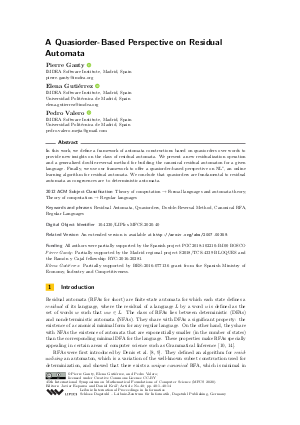A Quasiorder-Based Perspective on Residual Automata
Authors
Pierre Ganty  ,
Elena Gutiérrez
,
Elena Gutiérrez  ,
Pedro Valero
,
Pedro Valero 
-
Part of:
Volume:
45th International Symposium on Mathematical Foundations of Computer Science (MFCS 2020)
Part of: Series: Leibniz International Proceedings in Informatics (LIPIcs)
Part of: Conference: Mathematical Foundations of Computer Science (MFCS) - License:
 Creative Commons Attribution 3.0 Unported license
Creative Commons Attribution 3.0 Unported license
- Publication Date: 2020-08-18
File

PDF
LIPIcs.MFCS.2020.40.pdf
- Filesize: 0.51 MB
- 14 pages
Document Identifiers
Related Versions
-
An extended version is available at http://arxiv.org/abs/2007.00359.
Subject Classification
ACM Subject Classification
- Theory of computation → Formal languages and automata theory
- Theory of computation → Regular languages
Keywords
- Residual Automata
- Quasiorders
- Double-Reversal Method
- Canonical RFA
- Regular Languages
Metrics
- Access Statistics
-
Total Accesses (updated on a weekly basis)
0Document
0Metadata
Abstract
In this work, we define a framework of automata constructions based on quasiorders over words to provide new insights on the class of residual automata. We present a new residualization operation and a generalized double-reversal method for building the canonical residual automaton for a given language. Finally, we use our framework to offer a quasiorder-based perspective on NL^*, an online learning algorithm for residual automata. We conclude that quasiorders are fundamental to residual automata as congruences are to deterministic automata.
Cite As Get BibTex
Pierre Ganty, Elena Gutiérrez, and Pedro Valero. A Quasiorder-Based Perspective on Residual Automata. In 45th International Symposium on Mathematical Foundations of Computer Science (MFCS 2020). Leibniz International Proceedings in Informatics (LIPIcs), Volume 170, pp. 40:1-40:14, Schloss Dagstuhl – Leibniz-Zentrum für Informatik (2020)
https://doi.org/10.4230/LIPIcs.MFCS.2020.40
BibTex
@InProceedings{ganty_et_al:LIPIcs.MFCS.2020.40,
author = {Ganty, Pierre and Guti\'{e}rrez, Elena and Valero, Pedro},
title = {{A Quasiorder-Based Perspective on Residual Automata}},
booktitle = {45th International Symposium on Mathematical Foundations of Computer Science (MFCS 2020)},
pages = {40:1--40:14},
series = {Leibniz International Proceedings in Informatics (LIPIcs)},
ISBN = {978-3-95977-159-7},
ISSN = {1868-8969},
year = {2020},
volume = {170},
editor = {Esparza, Javier and Kr\'{a}l', Daniel},
publisher = {Schloss Dagstuhl -- Leibniz-Zentrum f{\"u}r Informatik},
address = {Dagstuhl, Germany},
URL = {https://drops.dagstuhl.de/entities/document/10.4230/LIPIcs.MFCS.2020.40},
URN = {urn:nbn:de:0030-drops-127071},
doi = {10.4230/LIPIcs.MFCS.2020.40},
annote = {Keywords: Residual Automata, Quasiorders, Double-Reversal Method, Canonical RFA, Regular Languages}
}
Author Details
Funding
All authors were partially supported by the Spanish project PGC2018-102210-B-I00 BOSCO
- Ganty, Pierre: Partially supported by the Madrid regional project S2018/TCS-4339 BLOQUES and the Ramón y Cajal fellowship RYC-2016-20281.
- Gutiérrez, Elena: Partially supported by BES-2016-077136 grant from the Spanish Ministry of Economy, Industry and Competitiveness.
References
-
Jirí Adámek, Robert S. R. Myers, Henning Urbat, and Stefan Milius. On continuous nondeterminism and state minimality. In MFPS, volume 308 of Electronic Notes in Theoretical Computer Science, pages 3-23. Elsevier, 2014.

-
Dana Angluin. Learning regular sets from queries and counterexamples. Inf. Comput., 75(2):87-106, 1987.

-
Benedikt Bollig, Peter Habermehl, Carsten Kern, and Martin Leucker. Angluin-style learning of NFA. In IJCAI, pages 1004-1009, 2009.

-
Janusz A. Brzozowski. Canonical regular expressions and minimal state graphs for definite events. Mathematical Theory of Automata, 12(6):529-561, 1962.

-
Janusz A. Brzozowski and Hellis Tamm. Theory of átomata. Theor. Comput. Sci., 539:13-27, 2014.

-
Aldo de Luca and Stefano Varricchio. Well quasi-orders and regular languages. Acta Inf., 31(6):539-557, 1994.

-
Aldo de Luca and Stefano Varricchio. Finiteness and Regularity in Semigroups and Formal Languages. Monographs in Theoretical Computer Science. An EATCS Series. Springer, 1999.

-
François Denis, Aurélien Lemay, and Alain Terlutte. Learning regular languages using non deterministic finite automata. In ICGI, volume 1891 of Lecture Notes in Computer Science, pages 39-50. Springer, 2000.

-
François Denis, Aurélien Lemay, and Alain Terlutte. Residual finite state automata. Fundam. Inform., 51(4):339-368, 2002.

-
François Denis, Aurélien Lemay, and Alain Terlutte. Learning regular languages using RFSAs. Theor. Comput. Sci., 313(2):267-294, 2004.

-
Pierre Ganty, Elena Gutiérrez, and Pedro Valero. A congruence-based perspective on automata minimization algorithms. In MFCS, volume 138 of LIPIcs, pages 77:1-77:14. Schloss Dagstuhl - Leibniz-Zentrum für Informatik, 2019.

- Pierre Ganty, Elena Gutiérrez, and Pedro Valero. A quasiorder-based perspective on residual automata, 2020. URL: http://arxiv.org/abs/2007.00359.
-
Pierre Ganty, Francesco Ranzato, and Pedro Valero. Language inclusion algorithms as complete abstract interpretations. In SAS, volume 11822 of Lecture Notes in Computer Science, pages 140-161. Springer, 2019.

-
Anna Kasprzik. Inference of residual finite-state tree automata from membership queries and finite positive data. In Developments in Language Theory, volume 6795 of Lecture Notes in Computer Science, pages 476-477. Springer, 2011.

-
Robert S. R. Myers, Jirí Adámek, Stefan Milius, and Henning Urbat. Coalgebraic constructions of canonical nondeterministic automata. Theor. Comput. Sci., 604:81-101, 2015.

-
Hellis Tamm. Generalization of the double-reversal method of finding a canonical residual finite state automaton. In DCFS, volume 9118 of Lecture Notes in Computer Science, pages 268-279. Springer, 2015.

